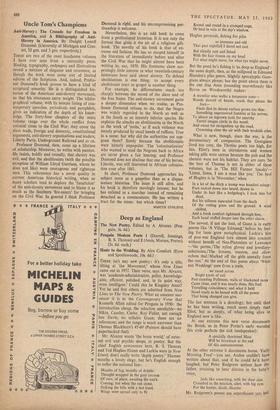Uncle Tom's Champions
Anti-Slavery : The Crusade for Freedom in America, and A Bibliography of Anti- Slavery in America. By Dwight Lowell Durpond. (University of Michigan and Cres- set, 10 gns. and 3 gns. respectively.)
THESE are two of the most handsome volumes
have ever seen from a university press. Binding, typography, endpapers and illustrations reveal a mixture of elegance and reverence, as though the work were some sort of limited edition of the Scriptures. And, indeed, Profes- sor Dumond's book proves to have a kind of scriptural sonority. He is a distinguished his- torian of the American anti-slavery movement. so that his utterances carry weight. The biblio- graphical volume, with its minute listing of con- temporary speeches, periodicals and pamphlets, gives an indication of the depth of his know- ledge. The forty-four chapters of the main volume range over the whole conflict from colonial times to the Civil War; they cover the slave trade, foreign and domestic, constitutional arguments, anti-slavery organisations and leaders, Liberty Party, Underground Railroad and so on.
Professor Dumond, then, sums up a lifetime of scholarship. Moreover, he writes with passion. He insists, boldly and roundly, that slavery was evil, and that the abolitionists (with the possible exception of William Lloyd Garrison, whom he does not like) were courageous and righteous men. This vehemence has a novel quality in current American historical writing, when so many scholars tend to deplore the 'fanaticism' of the anti-slavery movement and to blame it as much as the Southern 'fire-eaters' for bringing on the Civil War. In general I think Professor
Dumond is right, and his uncompromising par- tisanship is welcome.
Nevertheless, this is an odd book to come from a professional historian. It is not only the format that gives it the air of a religious gift- book. The novelty of his book is that of ex- treme old fashion. He has so steeped himself in the literature of immediately before and after the Civil War that he might almost have been writing in, say, 1870. His footnotes show sur- prisingly little interest in what twentieth-century historians have said about slavery. To defend abolitionism is one thing: to accept every abolitionist tract as gospel is another thing.
For example, he differentiates much too sharply between the mood of the slave and of the free States. The anti-slavery movement gains a deeper dimension when we realise, as Pro- fessor Dumond refuses to do, that the Negro was widely regarded in the North as well as in the South as an innately inferior species. He explains the attacks on abolitionists in the North as the work of 'mobs,' as if such violence was merely produced by small bands of ruffians. True in a sense; but why did the authorities not sup- press them? Surely because the abolitionists were bitterly unpopular. The 'colonisationists' who wanted to send the Negroes back to Africa are never given a fair hearing; and Professor Dumond does not disclose that one of his heroes, Lincoln, was still interested in African colonisa- tion even after 1861.
In short, Professor Dumond approaches his subject more as a gospeller than as a dispas- sionate historian. The issue is still alive, and his book is therefore movingly intense; but he has enlisted as a marcher instead of remaining detached as a commentator. He has written a tract for the times: but which times?
MARCUS CUNLIFFE






































 Previous page
Previous page